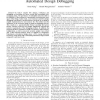Free Online Productivity Tools
i2Speak
i2Symbol
i2OCR
iTex2Img
iWeb2Print
iWeb2Shot
i2Type
iPdf2Split
iPdf2Merge
i2Bopomofo
i2Arabic
i2Style
i2Image
i2PDF
iLatex2Rtf
Sci2ools
110
Voted
ICCAD
2008
IEEE
2008
IEEE
A succinct memory model for automated design debugging
— In today’s complex SoC designs, verification and debugging are becoming ever more crucial and increasingly timeconsuming tasks. The prevalence of embedded memories adds to the difficulty of the problem by exponentially increasing the statespace of the design. In this work, a novel memory model for design debugging is presented. It models memory succinctly by avoiding an explicit representation for each memory bit. The method uses the simulation of the erroneous design to guide the debugging process. This results in a parameterizable formal encoding that grows linearly with the erroneous trace length, significantly reducing the memory requirements of the debugging problem. In addition, the proposed model is extended to handle an arbitrary initial memory configuration, as well as non-cycle accurate output traces where only a final expected memory state is available for comparison. Experiments on industrial designs show a 96% average reduction in memory usage along with a notic...
Related Content
| Added | 16 Mar 2010 |
| Updated | 16 Mar 2010 |
| Type | Conference |
| Year | 2008 |
| Where | ICCAD |
| Authors | Brian Keng, Hratch Mangassarian, Andreas G. Veneris |
Comments (0)

